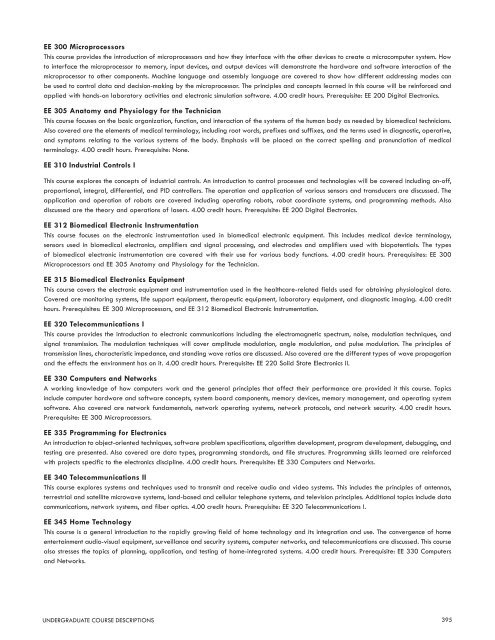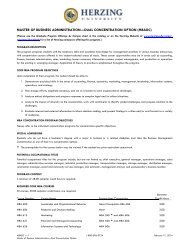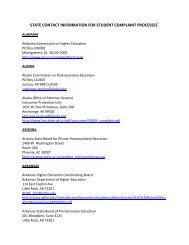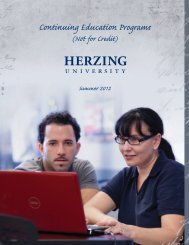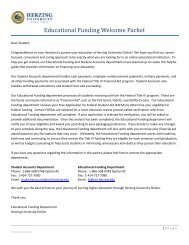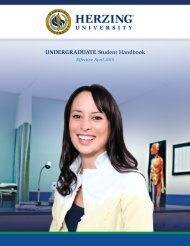Undergraduate - Herzing University
Undergraduate - Herzing University
Undergraduate - Herzing University
You also want an ePaper? Increase the reach of your titles
YUMPU automatically turns print PDFs into web optimized ePapers that Google loves.
EE 300 MicroprocessorsThis course provides the introduction of microprocessors and how they interface with the other devices to create a microcomputer system. Howto interface the microprocessor to memory, input devices, and output devices will demonstrate the hardware and software interaction of themicroprocessor to other components. Machine language and assembly language are covered to show how different addressing modes canbe used to control data and decision-making by the microprocessor. The principles and concepts learned in this course will be reinforced andapplied with hands-on laboratory activities and electronic simulation software. 4.00 credit hours. Prerequisite: EE 200 Digital Electronics.EE 305 Anatomy and Physiology for the TechnicianThis course focuses on the basic organization, function, and interaction of the systems of the human body as needed by biomedical technicians.Also covered are the elements of medical terminology, including root words, prefixes and suffixes, and the terms used in diagnostic, operative,and symptoms relating to the various systems of the body. Emphasis will be placed on the correct spelling and pronunciation of medicalterminology. 4.00 credit hours. Prerequisite: None.EE 310 Industrial Controls IThis course explores the concepts of industrial controls. An introduction to control processes and technologies will be covered including on-off,proportional, integral, differential, and PID controllers. The operation and application of various sensors and transducers are discussed. Theapplication and operation of robots are covered including operating robots, robot coordinate systems, and programming methods. Alsodiscussed are the theory and operations of lasers. 4.00 credit hours. Prerequisite: EE 200 Digital Electronics.EE 312 Biomedical Electronic InstrumentationThis course focuses on the electronic instrumentation used in biomedical electronic equipment. This includes medical device terminology,sensors used in biomedical electronics, amplifiers and signal processing, and electrodes and amplifiers used with biopotentials. The typesof biomedical electronic instrumentation are covered with their use for various body functions. 4.00 credit hours. Prerequisites: EE 300Microprocessors and EE 305 Anatomy and Physiology for the Technician.EE 315 Biomedical Electronics EquipmentThis course covers the electronic equipment and instrumentation used in the healthcare-related fields used for obtaining physiological data.Covered are monitoring systems, life support equipment, therapeutic equipment, laboratory equipment, and diagnostic imaging. 4.00 credithours. Prerequisites: EE 300 Microprocessors, and EE 312 Biomedical Electronic Instrumentation.EE 320 Telecommunications IThis course provides the introduction to electronic communications including the electromagnetic spectrum, noise, modulation techniques, andsignal transmission. The modulation techniques will cover amplitude modulation, angle modulation, and pulse modulation. The principles oftransmission lines, characteristic impedance, and standing wave ratios are discussed. Also covered are the different types of wave propagationand the effects the environment has on it. 4.00 credit hours. Prerequisite: EE 220 Solid State Electronics II.EE 330 Computers and NetworksA working knowledge of how computers work and the general principles that affect their performance are provided it this course. Topicsinclude computer hardware and software concepts, system board components, memory devices, memory management, and operating systemsoftware. Also covered are network fundamentals, network operating systems, network protocols, and network security. 4.00 credit hours.Prerequisite: EE 300 Microprocessors.EE 335 Programming for ElectronicsAn introduction to object-oriented techniques, software problem specifications, algorithm development, program development, debugging, andtesting are presented. Also covered are data types, programming standards, and file structures. Programming skills learned are reinforcedwith projects specific to the electronics discipline. 4.00 credit hours. Prerequisite: EE 330 Computers and Networks.EE 340 Telecommunications IIThis course explores systems and techniques used to transmit and receive audio and video systems. This includes the principles of antennas,terrestrial and satellite microwave systems, land-based and cellular telephone systems, and television principles. Additional topics include datacommunications, network systems, and fiber optics. 4.00 credit hours. Prerequisite: EE 320 Telecommunications I.EE 345 Home TechnologyThis course is a general introduction to the rapidly growing field of home technology and its integration and use. The convergence of homeentertainment audio-visual equipment, surveillance and security systems, computer networks, and telecommunications are discussed. This coursealso stresses the topics of planning, application, and testing of home-integrated systems. 4.00 credit hours. Prerequisite: EE 330 Computersand Networks.UNDERGRADUATE Course descriptions 395


